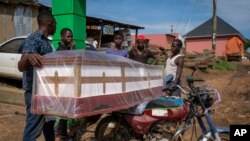The World Health Organization reports the Ebola virus has now spread to eight districts in Uganda, including the densely populated capital Kampala. The outbreak of this deadly hemorrhagic disease was detected in late September.
The latest WHO figures put the number of confirmed and suspected cases of Ebola in Uganda at 157, including 52 confirmed deaths and 21 probable deaths. This brings the case fatality rate up to nearly 40%.
The East African country is seeing an increase in the so-called Sudan strain of Ebola, which has no approved vaccines to prevent the virus from spreading. However, WHO reports three vaccine candidates have been identified that could be tested in randomized clinical trials in Uganda. No starting date has been set.
Janet Diaz, head of the WHO’s program for clinical management in health emergencies, recently returned from a week-long visit to Uganda to take stock of the current situation and assess the needs of health facilities in affected areas.
Even without a proven Ebola vaccine, she said lives can be saved by providing optimal supportive care.
“This includes early diagnosis and monitoring of patients so health workers can give immediate care for dehydration with IV fluids," she said. "They can correct glucose levels or electrolyte levels if they are low. They can ensure that patients get good nutrition, and that if they develop any co-infections, such as malaria that is treated appropriately.”
On November 1, WHO revised its Ebola risk assessment for Uganda from high to very high, and from low to high at the regional level. However, it determined the risk remained low at the global level.
Health officials say successful outbreak control relies on applying a package of interventions. Diaz cited community engagement as probably the most important.
To stop the Ebola outbreak, she noted the community must believe, engage and be part of that response. She said concerted efforts are being made to get the community to seek care if they have symptoms and to follow through on contact tracing.
“And then if any symptom occurs that they report it right away so they can get tested and treated," said Diaz. “I think if we can message around the treatment and safe care and good care in Ebola care facilities, then that we hope and that these facilities are inviting to patients and communities, that we would avoid any stigma or fear if someone gets diagnosed.”
Diaz said the WHO is helping Uganda’s Ministry of Health to establish more bed capacity and is involved in building at least three new patient facilities. She says more than 80 WHO experts on the ground are mentoring clinical staff on best care. In addition, she says large-scale training is taking place on infection prevention and control.
